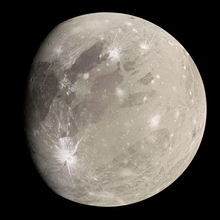This article needs additional citations for verification. (May 2014) |

An ice planet or icy planet is a type of planet with an icy surface of volatiles such as water, ammonia, and methane. Ice planets consist of a global cryosphere.
Under a geophysical definition of planet, the small icy worlds of the Solar System qualify as icy planets. These include most of the planetary-mass moons, such as Ganymede, Titan, Enceladus, and Triton; and also the known dwarf planets, such as Ceres, Pluto, and Eris. In June 2020, NASA scientists reported that it is likely that exoplanets with oceans, including some with oceans that may lie beneath a layer of surface ice, may be common in the Milky Way galaxy, based on mathematical modeling studies.[1][2]
- ^ NASA (18 June 2020). "Are planets with oceans common in the galaxy? It's likely, NASA scientists find". EurekAlert!. Retrieved 20 June 2020.
- ^ Shekhtman, Lonnie; et al. (18 June 2020). "Are Planets with Oceans Common in the Galaxy? It's Likely, NASA Scientists Find". NASA. Retrieved 20 June 2020.